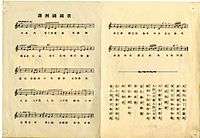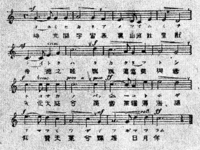National Anthem of Manchukuo
The National Anthem of Manchukuo was one of the many national symbols of independence and sovereignty created to foster a sense of legitimacy for Manchukuo in both an effort to secure international diplomatic recognition and to foster a sense of nationalism among its inhabitants.
During Manchukuo's short 13-year existence, two national anthems were used.
The National Anthem of Manchukuo was widely taught in schools and used in ceremonies in Manchukuo.[1]
1932 version
National anthem of | |
| Lyrics | Zheng Xiaoxu |
|---|---|
| Music | Kosaku Yamada |
| Adopted | May ?,1932 |
It is unclear when Manchuria began its first national anthem production, but it seems that preparations had already begun around the Manchuria National Declaration on March 1, 1932. On May 21, 1932, the Manchuria Sports Association formally applied to the Organizing Committee of the Olympics to dispatch players to the Los Angeles Olympics (held in July 1932). The Organizing Committee urges the Manchuria country to apply to the International Olympic Committee as “participation is approved by the International Olympic Committee (IOC)” and informs the Organizing Committee to send the national flag and national anthem I have done it. On the other hand, there is still a record that the Manchuria Sports Association sent a document stating that “the national flag and national anthem were sent to the organizing committee” to the secretary general of the Olympic organizing committee. (Before May) you can see that the song was completed.
入江克己「近代日本における植民地体育政策の研究(第2報)」(『鳥取大学教育学部研究報告. 教育科学』No.36、1994年 P86~87 repository.lib.tottori-u.ac.jp/ja/list/nii_type/Departmental%20Bulletin%20Paper/p/86/item/1855 17/11/2019 Browse
lyrics Manchu language (Transcription)
<lylis>
ti pi hsi tien kai
sung ohih ai hsi pai chih wei
wo shan ta i hsi sheng yu tsu wu
wo hsing po ai hsi huai yu chiu kai
shang shou kuo hsi i jen
pu shan shou hsi i ping
tien pu ai tao ti pu ai pao
ho wu chi chi yu ti hsi hsien chu tsan hao
shu fei heng muchih min hsi shin tzu hug tsao
地闢兮天開
松之涯兮白之隈
我伸大義兮繩於祖武
我行博愛兮懷於九垓
善守國兮以仁
不善守兮以兵
天不愛道地不愛寶
貨惡其於地兮獻諸蒼昊
孰非橫目之民兮視此洪造
1933 version
 Sheet music | |
National anthem of | |
| Lyrics | Zheng Xiaoxu |
|---|---|
| Music | Takatsu Toshi, Sonoyama Minpei, Muraoka Gakudō[2] |
| Adopted | March 1, 1933 |
| Relinquished | September 5, 1942 |
| Audio sample | |
National Anthem of Manchukuo
| |
The first national anthem was declared by State Council Decree No.4,[3] dated 24 February Dàtóng 2 (1933)[3] but publicized on March 1. The lyrics were written by Manchukuo's first Prime Minister Zheng Xiaoxu,[4][5] who was a devout Confucianist and Qing loyalist in addition to being an accomplished poet and calligrapher.
| Traditional Chinese | Pinyin | English translation |
|---|---|---|
| 天地內,有了新滿洲。 | Tiān dì nèi, yǒu liǎo xīn mǎnzhōu. | (Now) there is the new Manchuria on Earth. |
| 新滿洲,便是新天地。 | Xīn mǎnzhōu, biàn shì xīn tiān dì. | The new Manchuria is our new land. |
| 頂天立地,無苦無憂,造成我國家。 | Dǐng tiān lì dì, wú kǔ wú yōu, zào chéng wǒ guójiā. | Let us make our country to be upright and free of sadness. |
| 只有親愛並無怨仇, | Zhǐ yǒu qīn'ài bìng wú yuànchóu, | With only love and no hatred, |
| 人民三千萬,人民三千萬, | Rénmín sān qiān wàn, rénmín sān qiān wàn, | Thirty million people, thirty million people, |
| 縱加十倍也得自由。 | Zòng jiā shí bèi yě dé zìyóu. | at ten times more we should still be free. |
| 重仁義,尚禮讓,使我身修; | Zhòng rényì, shàng lǐràng, shǐ wǒ shēn xiū; | With virtue and li, rectified am I; |
| 家已齊,國已治,此外何求。 | Jiā yǐ qí, guó yǐ zhì, cǐwài hé qiú. | with family in order and with the state well-ruled, there are nothing I want. |
| 近之則與世界同化, | Jìn zhī, zé yǔ shìjiè tónghuà, | For now, may we assimilate with the world; |
| 遠之則與天地同流。 | Yuǎn zhī, zé yǔ tiāndì tóng liú. | for the future, may we follow the ways of the Heaven and Earth. |
1942 version
 Sheet music | |
National anthem of | |
| Lyrics | The national anthem committee |
|---|---|
| Music | Kosaku Yamada, Kiyoshi Nobutoki |
| Adopted | September 5, 1942 |
| Relinquished | August 9, 1945 |
| Audio sample | |
National Anthem of Manchukuo
| |
The national anthem was changed on 5 September Kāngdé 9 (1942), by State Council Order No. 201.[6] Prime Minister of Manchukuo Zhang Jinghui cited the 1933 version of the anthem was unsuitable for the current situations of the Empire[7] as the reason for the change. The new anthem, with Manchurian (i.e. Mandarin Chinese) and Japanese lyrics, was written by a committee, according to Zhang.[8] The 1933 anthem was renamed the Manchukuo Independence Song (滿洲國建國歌, pinyin: Mǎnzhōuguó jiàn guógē, Japanese Hepburn romanization: Manshukoku-kenkoku uta).
Lyrics
| Traditional Chinese | Pinyin | English translation |
|---|---|---|
| 神光開宇宙 表裏山河壯皇猷 | Shén guāng kāi yǔzhòu, biǎolǐ shānhé zhuàng huáng yóu | With the Universe created in God's Light, the vast land strengthens the Emperor's rule; |
| 帝德之隆 巍巍蕩蕩莫與儔 | Dì'dé zhī lóng wēiwēi dàngdàng mò yǔ chóu | So full is His virtue, so wide that it is beyond compare |
| 永受天祐兮 萬壽無疆薄海謳 | Yǒng shòu tiān yòu xī, wànshòuwújiāng bó hǎi xú | May He always receive divine guidance, with his years surpassing the sea; |
| 仰贊天業兮 輝煌日月侔 | Yǎng zàn tiān yè xī, huīhuáng rì yuè móu | [Let us] worship the divine work, its glory equals the sun and moon. |
| Japanese | Hepburn romanization | English translation |
| 大御光 天地に充ち | Ohomi-hikari ametsuchi ni michi | Filling the world with Divine light, |
| 帝徳は 隆く 崇し | Teitoku wa takaku totoshi | The Emperor's virtue is noble and worshipped. |
| 豊栄の 万寿ことほぎ | Toyosaka no banju kotohogi | Let us salute him with long life and prosperity |
| 天っ御業 仰ぎまつらむ | Ameemiwaza ogimatsuramu | and we revere the Emperor's deeds |
Official Interpretation
According to the official interpretation of the anthem issued on the same day of its adoption, the "God" in the first line refers to Amaterasu,[9] the sun goddess in Shinto, referring to Manchukuo's adoption of State Shinto as its state religion in 1940. Also, God's Light is interpreted as Arahitogami, i.e. Emperor of Japan. The whole of the first line is interpreted as
with this Divine Light, the Universe is created, and the bright and peaceful (it used the kanji 昭和, cognate of Shōwa, for bright and peaceful.) Light fills and shines over our Manchurian land and rivers, and with that we have our independence and our successes after independence. His Majesty the Emperor (i.e. Kangde) received this Divine Light to rule our country and to love our citizens. The first line [...] is an ode to our state.[10]
"The Divine Work" in the fourth line came from Kangde's Imperial Rescript on the Tenth Anniversary of the Nation on 1 March 1942, in which he mentioned,
We should sharpen our mind and spirits to sacrifice to the holy Greater East Asia War and help in the Divine Work of our Parent Nation...
and hence interpreted as:
This line describes the determination of our citizens. The Imperial Message on March 1 stated "[to] help in the Divine Work of the Parent Nation," and the Divine Work of Japan, our Parent Nation, is to revitalize East Asia and to create the Co-prosperity Sphere[...] Our country is the pioneer in the prosperity of East Asia[...] Our citizens should revere this Divine Work of our Parent Nation and to help it in all our endeavors, to finalize the goal of our independence, to rebuild the world, and that the Divine Work maybe as large and permanent as the sun and the moon.[11]
References
- "School children practicing national anthem". Archived from the original on 2014-08-26. Retrieved 2012-07-23.
- 『王道楽土の交響楽 満洲-知られざる音楽史』(岩野裕一著、1999年、ISBN 4276211247)
- Page 9, Manchukuo Government Notices Extra, March 1, Tatung 2 (1933)
- Chinese wikipedia
- http://david.national-anthems.net/mch.htm david.national-anthems.net
- Page 1, Manchukuo Government Notices No. 2493, September 5, Kangde 9 (1942). Reprinted 1990 by Shenliao Publishing House, Shenyang.
- Page 3, Annex, Manchukuo Government Notices No. 2493, September 5, Kangde 9 (1942). Reprinted 1990 by Shenliao Publishing House, Shenyang.
- The Prime Minister Talks About the Composition of the National Anthem, Page 3, Annex, Manchukuo Government Notices No. 2493, September 5, Kangde 9 (1942). Reprinted 1990 by Shenliao Publishing House, Shenyang.
- Explanation of the National Anthem, Head of the Propaganda Office of Manchukuo, Page 3, Annex, Manchukuo Government Notices No.2493, September 5, Kangde 9(1942). Reprinted 1990 by Shenliao Publishing House, Shenyang.
- Explanation of the National Anthem, Head of the Propaganda Office of Manchukuo, Page 3, Annex, Manchukuo Government Notices No.2493, September 5, Kangde 9(1942). Reprinted 1990 by Shenliao Publishing House, Shenyang.
- Explanation of the National Anthem, Head of the Propaganda Office of Manchukuo, Page 4, Annex, Manchukuo Government Notices No.2493, September 5, Kangde 9(1942). Reprinted 1990 by Shenliao Publishing House, Shenyang.